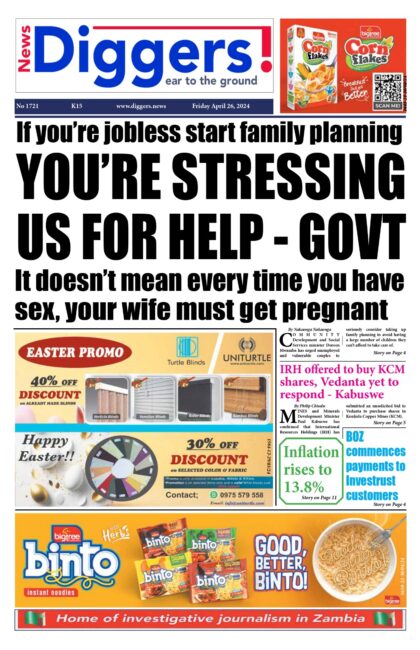Finance Minister Felix Mutati says starting this marketing season, government has scraped off the Farmer Input Support Programme and replaced it with the E-voucher system of paying farmers which will run at 100%.
And speaking at the joint press briefing by both the Ministry of Finance and Agriculture, Mutati said government has also scrapped off the 10 per cent export tax for maize grain on conditions that farmers meet the two million tonnes trigger point set by government on the production of the grain.
“The decision that we have taken as government is that for this farming season, we shall migrate to e-vouchers 100%. That FISP will no longer subdue. We have met with all the stakeholders including bankers, grain traders , transporters, agro-dealers. We are working out a system where for this season, we will be able to transfer money by the E-voucher including using mobile processes,” Mutati said.
“So all the stakeholders have been involved in this particular process so that government will no longer be the one that will be transporting fertilizer and seed to that farmer. This business will be private sector business given to the agro-dealers and therefore minimizing pressure on government particularly in financing fertilizer, and in financing seed. So this will happen for the coming season.”
And Mutati said grain production would determine whether maize export would be taxed.
“You recall that for the 2017 budget, we had introduced the export tax for maize of 10 percent, and the primary purpose of that export tax was to encourage value addition, that we should be adding value particularly for maize before it is exported. What was missing was also to achieve another objective to encourage production that whilst you encourage value addition, you must also encourage production particularly of maize and other crops,” Mutati said.
“So government has taken a decision that in order to meet the three objectives; of value addition, increased production particularly of maize, we have determined a trigger point that when production of maize in any given one year or season is two million tonnes or less! The 10 per cent will continue because we also need to secure food security. When the production is in excess of two million tonnes at the end of the season, the 10 per cent drops off. So this should motivate our farmers to be able to grow a lot more.”
He said this year, the 10 per cent would drop off.
“So in the current season where we have produced 3.6 million tonnes, that 10 per cent drops off. So we are hoping even next year, they could produce in excess of two million tonnes. So for all those of our private sectors wanting to export, they will not be charged the 10 per cent. And therefore government policy going forward will be determined by the trigger point of two million metric tonnes. So we will not be announcing opening or closing boarders, all we will announce is the effort of the farmer. They will be the ones to make the decisions whether the 10 per cent leaves or applies off. The decision is in the hands of the farmers and government will just encourage and motivate them,” The Minister said.
Mutati also announced that government had started dismantling of arrears in the agriculture sector.
“The third decision that we have taken is to begin to dismantle the arrears in the agriculture in orders to induce viability. And in doing so we have separated the two components. One component deals with Nitrogen Chemicals of Zambia (NCZ). At the moment, NCZ owes close to K1billion for the inputs that were supplied in the preceding farming season. This is a colossal amount and if we are to go forward! NCZ is asking for more money from the treasury in order to produce D-Compound fertilizer. So as government we have taken a decision to re-look at the business model of NCZ. So we will be engaging management next week with the potential to change the business model and how we address the indebtedness of NCZ,” said Mutati.
“There is a component of arrears associated with transporters and other players who have supplied fertilizers in the agriculture sector. Last week we paid a K100 million, next week we are paying another K100 million in our continued effort to dismantle the arrears in the agriculture sector. What has been very encouraging is that the banking community has now been more than enthusiastic to work with government at the level of supporting government with regard to the E-vouchers but much more critical to supporting government by providing the liquidity to facilitate Zambia Agricultural Commodities Exchange (ZAMEC) so that that warehouse receipt which is issued to a farmer can therefore be taken to the bank and in cash as agreed with the bank. And therefore relieving the pressure to the treasury to provide the resource to the farmers.”
Speaking at the same briefing, Agriculture Minister Dora Siliya said that the Food Reserve Agency (FRA) would participate in buying maize grain, rice and soya beans as apart of crop diversification program.
“Through the Food Reserve Agency (FRA), we are saying this year they will procure 500 thousand metric tonnes of crops which will include maize, soya beans and rice. As part of the diversification program we have invested through FISP in ten crops. We also believe that as part of the commodity marketing program, FRA should also participate in procurement of more crops and not just maize. We would have hoped that the FRA could this year participate in supporting, however logistical preparations were not in place for this year so they will just participate in maize, rice, and soya beans,” said Siliya.
“The FRA is a participant in the market like every other buyer of commodity crop, they are just a participant. And the FRA when they are ready they will be announcing their price at which they are prepared to buy. It is their price, not a flow price. It is the price that the FRA is prepared to participate in the market like everybody else. We have been advised by FRA that the moisture content average results as of yesterday is about 15.5 percent. The FRA will only get into the market when the moisture content is 12.5 percent and the reason is simple! Millers can get into the market simply because they mill the maize. But FRA stores the maize, so they can’t afford the high water content because the maize will germinate and go to waste. As part of our effort to get rid of our excess 1.4 million tonnes, we did remove the export ban and we have gone further now to remove the administrative ban that was placed in terms of exporting grain export to the Congo,” said Siliya.












